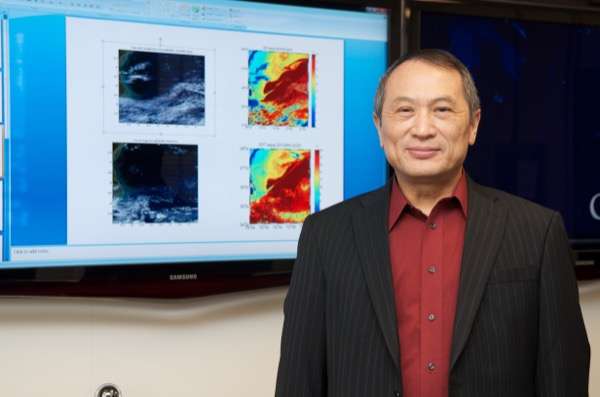Team reports on coastal ocean response to global warming acceleration and hiatus

In a new paper out in Nature Scientific Reports today, the University of Delaware's Xiao-Hai Yan and colleagues report on the coastal ocean response to global warming acceleration and hiatus.
The so-called global warming "hiatus" refers to the possible temporary slow-down of the global mean surface temperature trend said to have been occurring since 1998.
While many studies have focused on the mechanisms that caused the purported hiatus, few have paid attention to the coastal effects. Yan believes this area of study is critical as approximately 50 percent of the world's population lives within 124 miles of coastal waters, with many more relying on the world's coasts for commerce and natural resources.
"This is a hot topic that has caused heated debates within many scientific and policy spheres, but it also offers an opportunity to study and improve our understanding of climate change dynamics and our coastal responses," said Yan, Mary A.S. Lighthipe Chaired Professor and director of UD's Center for Remote Sensing.
"Putting sea surface temperature variability and its consequences into a global context is significant to understanding the spatial patterns of extreme events, as well as to conservation strategies and mitigation approaches for negative ecosystem responses in our coastal regions."
Co-authors on the work include UD graduate students Enhui Liao (the paper's lead author), Wenfang Lu and Autumn Kidwell; and Yuwu Jiang, a collaborator from the State Key Laboratory of Marine Environment Science in Xiamen University, China.
In the study, the researchers examined 15 years of sea surface temperature (SST) data, from 1998-2013, available through the National Oceanic and Atmospheric Administration.
Their findings showed that while the deep ocean was getting warmer during this time period, one-third of the world's coastal oceans in the low- and mid-latitudes experienced a cooling trend from 1998-2013.
For example, exceptionally cold water in the China Sea resulting from a cold event in the Taiwan Straight caused widespread coastal ecosystem casualties in temperature-sensitive coral reefs in 2008. Similarly, NOAA reported that record low water temperatures in the Florida Keys in 2010 caused cold-water coral bleaching and death for the first time in 30 years.
At the same time, 17.9 percent of the global coast showed a warming trend. Water temperatures along the Delaware coast during the same time period, for example, grew warmer—approximately .54 degrees per decade, Yan said.
Coinciding with this, there was a significant increase in the number of extremely hot days outside of the Delaware coastal region, from the Gulf of Maine to Cape Hatteras.
The SST trend reversals in the Northern Pacific and Atlantic coincided with the phase shift of Pacific Decadal Oscillation and North Atlantic Oscillation, respectively.
Meanwhile, a continuous increase of SST was detected for nearly 47 percent of coastlines with a strengthened warming along the coastlines in the high northern latitudes. Yan said this suggests the warming still continued and strengthened in some regions after 1998, but with a weaker pattern in the low- and mid-latitudes.
Coastal oceans are very sensitive to climate change, Yan said, and even a 0.5-degree change is enough to raise alarms in the coastal community.
"Historical knowledge tells us that a big El Niño always follows a big La Niña, like in 1997-98 and 1982-83. If this is the case, the global warming hiatus will continue, which could cause consequences including increased extreme hot/cold events," Yan said.
The most significant concern, he continued, is sea level rise.
Simply, thermal expansion causes sea level rise and higher temperatures mean more thermal expansion in coastal areas. This is particularly concerning for Delaware, which is a marine-oriented state with no part more than eight miles from tidal waters.
"The coastal ocean response to this global surface mean temperature slow down may vary from place to place, but overall, our coastal ocean responds faster to change than the global ocean, making coastal environments an important indicator of the larger global picture."
Yan and colleagues from across the globe will continue this conversation about the global warming acceleration and hiatus at the upcoming American Geophysical Union annual conference, Dec. 14-18, in San Francisco, during a special session by the U.S. Climate Variability and Prediction program.
More information: Enhui Liao et al. The coastal ocean response to the global warming acceleration and hiatus, Scientific Reports (2015). DOI: 10.1038/srep16630
Journal information: Scientific Reports
Provided by University of Delaware




















